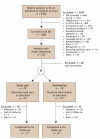Systematic detection and multidisciplinary care of depression in older medical inpatients: a randomized trial
- PMID: 16330624
- PMCID: PMC1319344
- DOI: 10.1503/cmaj.050519
Systematic detection and multidisciplinary care of depression in older medical inpatients: a randomized trial
Abstract
Background: Major depression is a frequent and serious disorder in older medical inpatients. Because the condition goes undetected and untreated in most of these patients, we conducted a randomized clinical trial to evaluate the effectiveness of a strategy of systematic detection and multidisciplinary treatment of depression in this population.
Methods: Consecutive patients aged 65 years or more admitted to general medical services in a primary care hospital between October 1999 and November 2002 were screened for depression with the Diagnostic Interview Schedule (DIS) within 48 hours after admission. Patients found to have major depression were randomly allocated to receive the intervention or usual care. The intervention involved consultation and treatment by a psychiatrist and follow-up by a research nurse and the patient's family physician. Research assistants, blind to group allocation, collected data from the patients at enrollment and at 3 and 6 months later using the Hamilton Depression Rating Scale (HAMD), the Medical Outcomes 36-item Short Form (SF-36), the DIS, the Mini-Mental State Examination (MMSE), the Older Americans Resources and Services (OARS) questionnaire to assess basic and instrumental activities of daily living (OARS-ADL and OARS-IADL) and the Rating Scale for Side Effects. Data on the severity of illness, length of hospital stay, health services and medication use, mortality and process of care were also collected. The primary outcome measures were the HAMD and SF-36.
Results: Of 1500 eligible patients who were screened, 157 were found to have major depression and consented to participate (78 in the intervention group and 79 in the usual care group). At randomization, there were no clinically or statistically significant differences between the 2 groups. Sixty-four patients completed follow-up to 6 months, 57 withdrew, and 36 died. At 6 months, there were no clinically or statistically significant differences the 2 groups in HAMD or SF-36 scores or any of the secondary outcome measures.
Interpretation: We were unable to demonstrate that systematic detection and multidisciplinary care of depression was more beneficial than usual care for elderly medical inpatients.
Figures
References
-
- Koenig HG, George LK, Petersen BL, et al. Depression in medically ill hospitalized older adults: prevalence, characteristics, and course of symptoms according to six diagnostic schemes. Am J Psychiatry 1997;154:1376-83. - PubMed
-
- Rapp SR, Parisi SA, Walsh DA. Psychological dysfunction and physical health among elderly medical inpatients. J Consult Clin Psychol 1988;56:851-5. - PubMed
-
- Fenton FR, Cole MG, Engelsmann F, et al. Depression in older medical inpatients. Int J Geriatr Psychiatry 1997;12:389-94. - PubMed
-
- Covinsky KE, Fortinsky RH, Palmer RM, et al. Relation between symptoms of depression and health status outcomes in acutely ill hospitalized older persons. Ann Intern Med 1997;126:417-25. - PubMed
Publication types
MeSH terms
LinkOut - more resources
Full Text Sources
Medical

